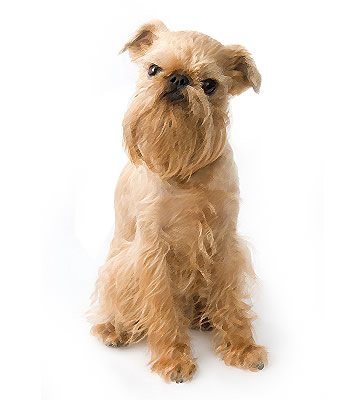Breed Info Summary
Breed Suits: Families, apartment living, affectionate
Shedding/Non-Shedding; Moderate
Size: Small
Origin
Griffons were originally known as great rat-catchers. The modern Brussels Griffon was developed in Belgium in the mid-1800s, when native terrier-type dogs were crossed with a variety of other breeds. The flat-faced and bearded Brussels Griffon emerged from this, and the breed's transformation from working dog to faithful little companion began.
The Belgian court preferred the breed in the 1870s, and the royal seal of approval resulted in a spike in popularity. The dogs were sold throughout Europe and to the United States, where the Brussels Griffon was recognized by the American Kennel Club (AKC) in 1910.
Over time, these cheeky little dogs have became popular as house and family pets.
Personality
Brussels Griffons are bold, playful dogs who require daily activity in the form of a moderately long walk or an indoor game.
They are alert and curious, and interested in their environment. The Griffon’s affectionate and caring nature make it a wonderful dog for your family. They enjoy playing and get along with other people.
Brussels Griffons, like all dogs, require early socialisation – exposure to a variety of people, sights, sounds, and experiences — when they are young. Socialisation ensures that your puppy develops into a well-rounded adult dog.
Pros and cons to consider
Pros
- Easy to carry
- Great watchdog
- Convenient to keep even in a small apartment
- Get along with children and animals
Cons
- Stubbornness and Barking
- Griffons are difficult to breed
- Risk for joint disease. They may also experience issues of physical deformities.


